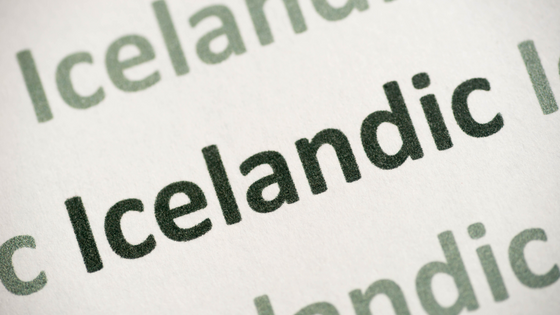

The words “love“ and “hate“ are very strong words. To be fair, I don‘t actually love or hate any part of learning the Icelandic language but those words work much better in a title than what I “enjoy the most“ and what I “strongly dislike“. So, just take those words with a big grain salt.
Regarding some backstory, I have been learning Icelandic off and on since I moved in 2016. It certainly has not been a linear journey, and I‘ve had many ups and downs but progress is happening.
5 Things I Love About Learning Icelandic
- Having a secret language you can speak around the world. Most people don’t know the language and being able to speak the language around others without them know what you are saying is pretty cool.
- There are unusual sounds, such as thedouble ll sound and I enjoy trying to mimic these sounds
- You have the tools to be able to read Old Icelandic. The language has evolved slowly enough that the current language gives you the ability to read Old Icelandic text, like reading something from the 12th century
- Interesting insight into the culture. For instance, there are a lot of words for snow like hundslappadrífa (snow flakes that are big like dog paws), Snædís (snow fairy or snow goddess), and so on.
- When I do speak Icelandic to someone who knows the language well or grew up speaking it, they are delighted to hear that I am learning. The language learning journey has been difficult for me at time, so any and all encouragement is greatly appreciated.
5 Things I Hate About Learning Icelandic
- Icelandic Grammar can be complicated because there are four cases
- Nouns, adjectives and pronouns are declined in these cases. There are also several genders and that makes a big difference too. Numbers from 1-4 are also a pain in the butt sometimes
- Remembering how to decline properly can really trip you up
- I used to only make simple sentences for a while because I was so worried about making a mistake with the grammar
- Use the example of a horse
- A Horse – hestur (nominative)
- About a Horse – um hest (accusative)
- From a horse – frá hesti (dative)
- To a horse – til hests (genitive)
- There are a decent amount of exceptions in the language that can be a little frustrating too. This happens with nouns and verbs. Sometimes there is a not a clear answer as to why that is the case. Sometimes if I ask for an explanation about something, my teacher will just say af því bara ( just because).
- I sometimes sound hesitant when I speak because I am not sure if I said it correctly.
- An example is if I want to say ég fór til Reykjavíkur, my inflection might sound like there is a question mark at the end because I am not sure if what I wanted to say is correct.
- Homynoyms in Icelandic can be confusing, at times.
- Bóndinn á Á á á á á
- The farmer at a farm called Á has an Ewe by a river
- Homonyms can make it tricky
- Icelanders like to practice their English and can easily switch over to speaking English or they want to feel like they are helping you when they hear that you do not speak the language well
- It can also be that they think the person sucks at the language (LOL)
- To combat this, I try to let people know I am practicing Icelandic so they don’t immediately switch to English
Random Fact of the Episode
Eiríkur Rögnvaldsson, professor emeritus of Icelandic linguistics, wrote in an article that he would like unions to push for employers to bear the cost of teaching foreign employees Icelandic.
Icelanders need to get used to others learning the subject
We are used to being a monolingual nation. It's been a while since there were very few foreigners here. In the past, there were merchants and officials who spoke strange Icelandic, and people made fun of it,"
Eiríkur Rögnvaldsson Tweet
Icelanders are not used to people learning Icelandic and not speaking it perfectly.
"What I was saying is that we just have to get used to it, because it's quite clear that the number of foreigners will continue to increase here. There is nothing to suggest otherwise. It has been demonstrated that people are needed for work in the coming years."
Eiríkur Rögnvaldsson Tweet
Icelandic Word(s) of the Episode
Hata (hate) – ég hata þig
Elska (love) – ég elska þig
Share This Post
Þakka þér kærlega fyrir að hlusta og sjáumst fljótlega (Thank you kindly for listening and see you soon).